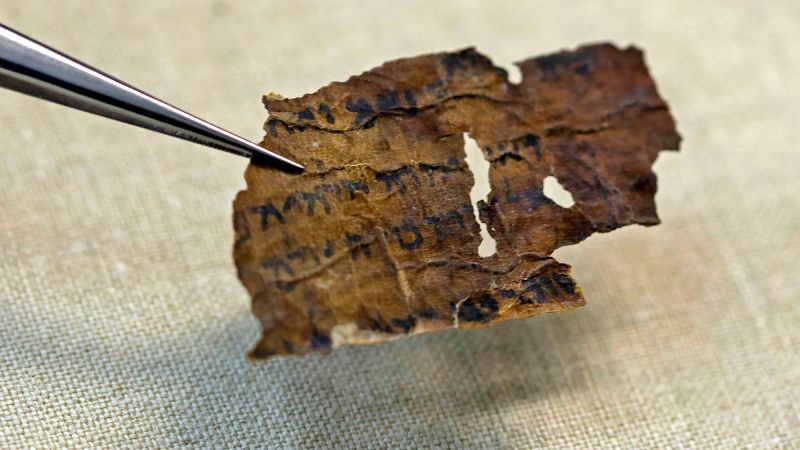Many of the Dead Sea Scrolls, some of the most widely known archaeological finds of all time, may be older than once thought, according to a new study.
The fresh analysis, which paired radiocarbon dating with artificial intelligence, determined some of the biblical manuscripts date to about 2,300 years ago, when their presumed authors lived, said Mladen Popović, lead author of the report published Wednesday in the journal PLOS One.
Bedouin shepherds first spotted the scrolls by chance in the Judaean Desert, near the Dead Sea, in 1947. Archaeologists then recovered thousands of fragments belonging to hundreds of manuscripts from 11 caves, all near the site of Khirbat Qumran in what is now the West Bank.
“The Dead Sea Scrolls were extremely important when they were discovered, because they completely changed the way we think about ancient Judaism and early Christianity,” said Popović, who is also dean of the Faculty of Religion, Culture and Society at the University of Groningen in the Netherlands. “Out of around 1,000 manuscripts, a bit more than 200 are what we call biblical Old Testament, and they are the oldest copies we have of the Hebrew Bible. They gave us a lot of information about what the text looked like back then.”
The scrolls are like a time machine, according to Popović, because they let scholars see what people were reading, writing and thinking at the time. “They are physical, tangible evidence of a period of history that is crucial — whether you’re Christian, Jewish or don’t believe at all, because the Bible is one of the most influential books in the history of the world, so the scrolls allow us to study it as a form of cultural evolution,” he said.
Almost none of the Dead Sea Scrolls — which were written mostly in Hebrew on parchment and papyrus — have dates on them. Based primarily on paleography, the study and deciphering of ancient writing and manuscripts, scholars have believed the manuscripts range from the third century BC to the second century AD. “But now, with our project, we have to date some manuscripts already to the end of the fourth century BCE,” he said, meaning that the earliest scrolls could be up to 100 years older than previously thought.
“That’s really exciting because it opens up new possibilities to think about how these texts were written and how they moved to other users and readers — outside of their original authors and their social circles,” Popović added.
The findings will not only inspire further studies and affect historical reconstructions, according to the authors of the report, but will also unlock new prospects in the analysis of historical manuscripts.
Determining the age of Dead Sea Scrolls
Earlier estimates of the manuscripts’ age came from radiocarbon dating conducted in the 1990s. Chemist Willard Libby developed this method — used to ascertain the age of organic materials — in the late 1940s at the University of Chicago. Also known as carbon 14 dating, a chemical analysis of a sample, such as a fossil or manuscript, determines the quantity of carbon 14 atoms it contains. All living organisms absorb this element, but it starts to decay as soon as death occurs, so looking at how much is left can give a fairly accurate age of an organic specimen as old as about 60,000 years.
Carbon dating has downsides, however. The analyzed sample is destroyed during the process, and some results can be misleading. “The problem with earlier tests (on the scrolls) is that they didn’t address the issue of castor oil,” Popović said. “Castor oil is a modern invention, and it was used in the 1950s by the original scholars to make the text more legible. But it’s a modern contaminant, and it skews the radiocarbon result to a much more modern date.”
The study team first used new radiocarbon dating, applying more modern techniques, on 30 manuscripts, which revealed that most of them were older than previously thought. Only two were younger.
The researchers then used high-resolution images of these newly dated documents to train an AI they developed, called Enoch after the Biblical figure who was the father of Methuselah. The scientists presented Enoch with more documents they had carbon-dated, but withheld the dating information, and the AI correctly guessed the age 85% of the time, according to Popović. “In a number of cases, the AI even gave a narrower date range for the manuscripts than the carbon 14 did,” he said.
Next, Popović and his colleagues fed Enoch more images from 135 different Dead Sea Scrolls that were not carbon-dated and asked the AI to estimate their age. The scientists rated the results as “realistic” or “unrealistic,” based on their own paleographic experience, and found that Enoch had given realistic results on 79% of the samples.
Some of the manuscripts in the study were found to be 50 to 100 years older than formerly thought, Popović said.
One sample from a scroll known to contain verse from the Book of Daniel was once believed to date to the second century BC. “That was a generation after the original author,” Popović said, “and now with the carbon 14, we securely move it (further back) to the time of the author.”
Another manuscript, with verses from the Book of Ecclesiastes, also dates older, Popović added. “The manuscript was previously dated on paleographic grounds to 175 to 125 BCE, but now Enoch suggests 300 to 240 BCE,” he said.
Eventually, artificial intelligence could supplant carbon 14 as a method of dating manuscripts, Popović suggested. “Carbon 14 is destructive,” he said, “because you need to cut off a little piece of the Dead Sea Scroll, and then it’s gone. It’s only 7 milligrams, but it’s still stuff that you lose. With Enoch, you don’t have to do any of this. This a first step. There are all sorts of possibilities to improve Enoch further.”
If the team pushes forward with Enoch’s development, Popović believes it could be used to assess scripts such as Syriac, Arabic, Greek and Latin.
‘A massive step forward’
Scholars who were not involved with the study were encouraged by the findings.
Having both AI and an enhanced carbon 14 dating method allows a level of calibration across both methodologies that is helpful, according to Charlotte Hempel, a professor of Hebrew Bible and Second Temple Judaism at the University of Birmingham in the United Kingdom. “The pronounced pattern seems to be that AI offers a narrower window within the Carbon 14 window,” she said via email. “I wonder whether this suggests a higher level of precision, which would be extremely exciting.”
The study represents a first attempt to harness AI technology to extend existing scientific knowledge from carbon 14 dating of certain manuscripts to other manuscripts, said Lawrence H. Schiffman, Global Distinguished Professor of Hebrew and Judaic Studies at New York University.
“To some extent, it is not yet clear whether or not the new method will provide us with reliable information on texts that have not yet been Carbon-14 dated,” he added via email. “The interesting comments regarding revision of the dating of some manuscripts that may be expected through further development of this approach or new carbon-14 dating, while not new to this study, constitute a very important observation about the field of Dead Sea Scrolls in general.”
Commenting on the computational aspects of the study, Brent Seales, the Alumni Professor of Computer Science at the University of Kentucky, said the approach taken by the authors seems rigorous even if the sample sizes are small.
Using AI to completely replace carbon dating may be premature, however. “(AI) is a useful tool to incorporate into the broader picture, and to make estimates in the absence of Carbon-14 based on the witness of other similar fragments,” Seales wrote in an email.
“Like everything with machine learning, and like a fine wine, it should get better over time and with more samples. The dating of ancient manuscripts is an extremely difficult problem, with sparse data and heavy constraints on access and expertise. Bravo to the team for this data-driven contribution that takes a massive step forward.”
The post AI analysis of ancient handwriting gives new age estimates for Dead Sea Scrolls appeared first on CNN.




